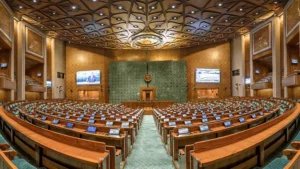GS-2: Polity and Governance

Key Points:
- India’s parliamentary oversight has weakened due to limited scrutiny by committees and the executive evading accountability.
- Standing Committees meet infrequently, lack follow-through, and their recommendations rarely influence policy.
- The article calls for “Maximum Accountability” alongside “Maximum Governance.”
- Proposes reforms like mandatory discussions of committee reports, enhanced research support, and technology adoption.
In-Depth Analysis: Declining Oversight:
- Tools like Question Hour, Zero Hour, and Committees exist, but oversight remains reactive.
- Committees face challenges like short-term memberships, limited technical support, and low political motivation for action.
Positive Contributions:
- Railways Committee: Suggested waiving dividends in 2016 to bolster finances.
- Transport Committee: Revised the 2017 Motor Vehicles Bill to limit third-party insurance and create a National Road Safety Board.
- Public Undertakings and PAC: Influenced defense spending and domestic production.
Reform Proposals:
- Publicize committee findings in local languages, with videos and visual aids.
- Require parliamentary discussions of DRSC reports with ministerial responses.
- Enhance MP support staff for deeper scrutiny of budgets and bills.
- Form cross-ministerial subcommittees for complex issues.
Technology’s Role:
- AI and data analytics can detect irregularities and provide real-time oversight dashboards.
- Bridges expertise gaps in legislative processes.
Scientific/Administrative Terms:
Parliamentary Standing Committees (DRSCs): Department-specific groups tasked with reviewing policies and legislation.
- Zero Hour and Question Hour: Mechanisms for raising urgent issues and ensuring executive accountability.
- Public Accounts Committee (PAC): Audits government spending for transparency.
Significance:
- Stronger oversight would enhance transparency, public trust, and democratic accountability.
Reinforces separation of powers and improves governance quality.




